Thesaurus : Doctrine

► Full Reference: B. Sillaman, "Taking the Compliance U.S. Procedural Experience globally", in M.-A. Frison-Roche (ed.), Compliance Jurisdictionalisation, Journal of Regulation & Compliance (JoRC) and Bruylant, coll. "Compliance & Regulation", to be published.
____
📘read a general presentation of the book, Compliance Jurisdictionalisation, in which this article is published
____
► Summary of the article (done by the Journal of Regulation & Compliance): The French legal system is evolving, organizing interaction between lawyers with regulators and prosecutors, specially in investigations about corruption or corporate misconduct, adopting U.S. negotiated resolutions such as the Convention judiciaire d'intérêt public, which encourages "collaboration" between them.
The author describes the evolution of the U.S. DOJ doctrine and askes French to be inspired by the U.S. procedural experience, U.S. where this mechanism came from. Indeed, the DOJ released memoranda about what the "collaboration" means. At the end (2006 Memorandum), the DOJ has considered that the legal privilege must remain intact when the information is not only factual in order to maintain trust between prosecutors, regulators and lawyers.
French authorities do not follow this way. The author regrets it and thinks they should adopt the same reasoning as the American authority on the secret professionnel of the avocat, especially when he intervenes in the company internal investigation.
____
🦉This article is available in full text to those registered for Professor Marie-Anne Frison-Roche's courses
________
Compliance and Regulation Law bilingual Dictionnary

In Europe, Community Law prohibits States from providing aid to companies, which are analyzed as means for the benefit of their country which the State cares about (and sometimes wrongly) having the effect and maybe the object of maintaining or constructing borders between peoples, thus contradicting the first European political project of a common area of peace and exchanges between the peoples of Europe. That is why this prohibition does not exist in the United States, since Antitrust Law is not intended to build such a space, which is already available to businesses and people.
This essential difference between the two zones changes industrial policies because the US federal Government can help sectors where Member States can not. The European prohibition of State Aid can not be called into question because it is associated with the political project of Europe. This seems to be an aporia since Europe is handicapped against the United States.
In any form it takes, Aid is prohibited because it distorts equality of opportunity in competition between operators in the markets and constitutes a fundamental obstacle to the construction of a unified European internal market. On the basis of this simple principle, a branch of technical and specific law has developed, because States continue to support their entreprises and sectors, and many rules and cases divide this principe of prohibition into as many exceptions and nuances. Is built over the years a probation system related to it. Thus, the concept of a public enterprise was able to remain despite this principle of prohibition.
But if there is a crisis of such a nature or magnitude that the market does not succeed by its own forces to overcome and / or the European Union itself pursues a-competitive objectives, exogenous Regulation, which can then take the form of legitimate State Aid. Thus a sort of synonymy exists between State Aid and Regulation.
For this reason, the European institutions have asserted that State Aid becomes lawful when it intervenes either in strategic sectors, such as energy production in which the State must retain its power over assets, or the defense sector. Far from diminishing, this hypothesis is increasing. European Union Law also allows the State to intervene by lending to financial operators threatened with default or already failing, the State whose function is to fight systemic risk, directly or through its Central Bank. The aid can come from the European Central Bank itself helping States in issuing sovereign debt, the Court of Justice having admitted in 2015 the non-conventional monetary policy programs compliance with the treaties. In 2010, the European Commissioner for Competition stressed that public aid is essential tools for States to deal with crises, before regulations come to the fore in 2014 to lay the foundations of the European Banking Union.
Compliance and Regulation Law bilingual Dictionnary

The Federal Communications Commission (FCC) is the independent regulatory authority in the United States that regulates at the federal level both the container and the content of telecommunications.
In this, the United States differs from the European Union, a legal space in which most often the regulatory institutions of the container and the content are distinct (for example in France ARCEP / CSA / CNIL) and in which the regulations of communications remain substantially at the level of the Member States of the Union.
Like other audiovisual regulators, it ensures pluralism of information by limiting the concentration of capital - and therefore of power - in the television and radio sector. We can thus see that the American system is not in principle different from the European system.
In addition, the FCC is characterized first of all by a very great power, imposing at the same time substantial principles on the operators, like that of the "decency", going in the name of this principle until sanctioning television channels which had let show a bare breast of a woman. The control is therefore more substantial than in Europe, this control weighing against the constitutional freedom of expression which is more powerful in the United States than in Europe. It is true that today the leading digital companies tend to formulate for us what is beautiful, good and decent, in place of public authorities.
The FCC continued to develop the major principles of the public communication system, as in 2015 that of the Open Internet (Open Internet) or to formulate the principle of "digital neutrality", adopted by a federal law, this principle having considerable economic and political implications.
But at the same time, a general mark of American law, the judge moderates this power, according to the principle of Check and Balance. Thus the Supreme Court of the United States in FCC v. Pacifica Foundation in 1978 this power of direct control of the content but also operates the control of the control.
The election in 2016 of a new president who is, among other things, totally hostile to the very idea of Regulation is a test in the probative sense of the term. In January 2017, he appointed a new president of the FCC, hostile to any regulation and in particular to the principle of neutrality. The question which arises is to know if technically a regulation already established on these principles can resist, how and for how long, a political will violently and expressly contrary. And what will the judges do.
Compliance and Regulation Law bilingual Dictionnary

First of all, the Regulation and Compliance Law is difficult to understand in others languages than English, through translation, for example in French. This corpus of rules and institutions suffers from ambiguity and confusion because of its vocabulary of Anglophone origin, in which words or expressions that are similar or identical have not the same meaning in English and, for example, in French..
To every lord all honor, this is the case for the term "Regulation".
In English, "regulation" refers to the phenomenon which the French language expresses by the term "Régulation". But it can also aim at the complete fitting of what will hold a sector reaching a market failure and in which regulation is only one tool among others. The expression "regulatory system" will be used with precision, but also the term "Regulation", the use of the capital letter indicating the difference between the simple administrative power to take texts ("regulation") and the entire system which supports the sector ("Regulation"). It is inevitable that in a quick reading, or even by the play of digital, which overwrites the capital letters, and the automatic translations, this distinction of formulation, which stands for a lower / upper case, disappears. And confusion arises.
The consequences are considerable. It is notably because of this homonymy, that frequently in the French language one puts at the same level the Droit de la Régulation ("regulatory law, Regulation") and the réglementation (regulation). It will be based on such an association, of a tautological nature, to assert that "by nature" the Regulatory Law is "public law", since the author of the reglementation (regulation) is a person of public law, in particular the State or Independent administrative authorities such as Regulators. There remains the current and difficult justification for the considerable presence of contracts, arbitrators, etc. Except to criticize the very idea of Regulatory Law, because it would be the sign of a sort of victory of the private interests, since conceived by instruments of private law.
Thus two major disadvantages appear. First of all, it maintains in the Law of Regulation the summa divisio of Public and Private Law, which is no longer able to account for the evolution of Law in this field and leads observers, notably economists or international Institutions, to assert that the Common Law system would be more adapted today to the world economy notably because if it does indeed place administrative law, constitutional law, etc., it does not conceive them through the distinction Law Public / private law, as the Continental system of Civil Law continues to do.
Secondly, no doubt because this new Law draws on economic and financial theories that are mainly built in the United Kingdom and the United States, the habit is taken to no longer translate. In other languages, for example, texts written in French are phrases such as "le Régulateur doit être accountable".
It is inaccurate that the idea of accountability is reducible to the idea of "responsibility". The authors do not translate it, they do not recopy and insert it in texts written in French.
One passes from the "translation-treason" to the absence of translation, that is to say to the domination of the system of thought whose word is native, here the U.K. and the U.S.A.
One of the current major issues of this phenomenon is in the very term of "Compliance". The French term "conformité" does not translate it. To respect what compliance is, it is appropriate for the moment to recopy the word itself, so as not to denature the concept by a translation. The challenge is to find a francophone word that expresses this new idea, particularly with regard to legal systems that are not common law, so that their general framework remains.
Thesaurus : Soft Law
Référence complète : Gauvain, R. et Marleix, O., Rapport d'information sur l'évaluation de l'impact de la loi n° 2016-1691 du 9 décembre 2016 relative à la transparence, à la lutte contre la corruption et à la modernisation de la vie économique, 2021.
____
________
Thesaurus : Doctrine
► Référence complète : D. Esty et M. Hautereau-Boutonnet, "Derrière les procès climatiques français et américains : des systèmes politique, juridique et judiciaire en opposition", D.2022, p.1606 et s.
____
Thesaurus : 07. Cours d'appel
Référence : Grenoble, 5 nov. 2020, I.D. c/ Société Corin France
Sept. 4, 2025
Thesaurus : Doctrine

► Full Reference: R. Gauvain & B. Balian, "Opposition et convergence des systèmes juridiques américains et européens dans les règles et cultures de compliance" ("Opposition and Convergence of American and European Legal Systems in Compliance Rules and Cultures"), in M.-A. Frison-Roche (ed.), L'Obligation de Compliance, Journal of Regulation & Compliance (JoRC) and Editions Lefebvre - Dalloz, "Régulations & Compliance" Serie, 2025, forthcoming.
____
📕read the general presentation of the book, L'Obligation de Compliance, in which this article is published
____
► English Summary of this contribution (done by the Journal of Regulation & Compliance - JoRC) : Les auteurs appréhendent la Compliance à travers ses outils, principalement les programmes de compliance par lesquels les entreprises se conforment aux réglementations et les investigations menées par les entreprises sur la demande des autorités publiques pour repérer des risques et les nouveaux modes de défense consistant à nouer des accords avec les autorités de poursuite.
L'article souligne l'inspiration américaine qui a porté ce mouvement par lequel l'Etat, principalement à fin d'efficacité, transfère aux entreprises la charge de poursuivre des "buts monumentaux". A partir de cela et dans un premier temps, est montré l'importation de mécanismes américains en Europe, notamment en France, la CJIP reprenant bien des caractéristiques du DPA, même si les particularismes demeurent, par exemple dans les mécanismes de l'alerte. Dans un second temps est montrée la convergence entre les 2 systèmes car à travers les obligations de compliance qui constituent le cœur de ces outils de compliance c'est toujours les valeurs occidentales qui sont exprimées, valeurs communes au Droit américain et au Droit européen et des pays européens. Elle a permis cette importation et l'on mesure aujourd'hui que ces valeurs sont portées plus fortement par l'Europe, notamment à travers l'obligation de vigilance et le DSA.
____
🦉This article is available in full text to those registered for Professor Marie-Anne Frison-Roche's courses
________
June 4, 2025
Publications
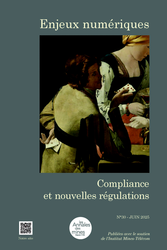
🌐follow Marie-Anne Frison-Roche on LinkedIn
🌐subscribe to the Newsletter MAFR Regulation, Compliance, Law
🌐subscribe to the Video Newsletter MAFR Surplomb
🌐subscribe to the Newsletter MaFR Droit & Art
____
► Full Reference: P. Bonis & M.-A. Frison-Roche, "Réguler le numérique, ou Sisyphe heureux" (Regulating Digital, or a happy Sisyphus), in P. Bonis & L. Castex (dir.), Compliance et Nouvelles Régulations, Les Annales des Mines, series "Enjeux numériques, June 2025, p.5-7.
____
📝read the article (in French)
____
📗read the table of content of this special issue of Enjeux numérique, Régulation et Compliance (in French), in which this introductory article is published.
____
► English Summary of this article: This introduction to the collective publication on Regulation and Compliance, which aims to bring order to the Digital space, takes up the idea expressed by Camus when he referred to 'happy' Sisyphus, and expresses the idea that Regulation and Compliance are applied to this area with difficulty, relentlessness and failure, with texts constantly being adopted, modified and amplified on all sides, while the Digital Space is constantly changing, and the slope is constantly being climbed again. But this should not be seen as a failure, not even a flaw, because it is in the nature of digital regulation to always place the regulatory apparatus on our shoulders.
This weight is shared by all, by the Authorities of all countries, because there is something common to all and also because there is something specific for each, because the techniques differ and because the visions of the world that the Politicians print in the texts and project in the Digital will always differ. This weight is also shared by companies, which internalise the rules through Compliance mechanisms, making them necessary agents for the efficiency and sustainability of the digital system, but also players in it, in articulation with Internet users in a permanent and unstable articulation with the local to the finest and this global that the Internet has invented.
This presentation opens the series of contributions to the collective publication Régulation et Compliance, which makes up this special issue of Enjeux numériques in Annales des Mines.
____
🌐read also the English presentation of:🕴️Marie-Anne Frison-Roche, 📝Le Droit de la compliance, voie royale pour réguler l'espace numérique (Compliance Law as a Royal Road for regulating the Digital Space)
________
May 10, 2025
Thesaurus : Doctrine
► Référence complète : G. Beaumier & L. Gjesvik, "Digital Governance in a Rubber Band: Structural Constraints in Governing a Global Digital Economy", Global Studies Quarterly, vol. 5, issue 2.
____
____
► Résumé de l'article (fait les auteurs) : L’on représente souvent les États-Unis, l’Union européenne et la Chine comme l’incarnation de trois modèles de gouvernance numérique qui s’opposent. Leurs approches « de marché », « démocratique » et « autoritaire » refléteraient leurs préférences respectives s’agissant des acteurs qui devraient contrôler le développement et l’utilisation des technologies numériques. Nous affirmons qu’outre le fait de représenter différentes préférences, chaque modèle se distingue par la façon dont il résout les tensions inhérentes au gouvernement d’une économie numérique dans un contexte mondial. Lors de la création de nouvelles politiques numériques, les juridictions doivent composer avec les tensions pour atteindre trois objectifs: le maintien d’une autonomie réglementaire, la promotion de la compétitivité sur le marché et le soutien d’écosystèmes numériques ouverts et interopérables. Chose remarquable, plus elles s’efforcent d’atteindre au moins l’un de ces objectifs, plus il est difficile de progresser sur les autres, mécanisme qui met en évidence un « effet d’élastique ». Nous utilisons cet argument pour comprendre les changements de politique numérique au cœur de chaque juridiction, soulignant ce faisant qu’elles font montre de plus de dynamisme que l’on ne l’imagine généralement.
____
The United States, the European Union, and China are often portrayed as representing three competing models of digital governance. Their so-called market, democratic, and authoritarian approach supposedly reflects their respective preferences over which actors should control the development and use of digital technologies. We argue that more than representing different preferences, each model differs in how it resolves inherent tensions associated with governing a digital economy in a global context. When devising new digital policies, jurisdictions must navigate tensions between achieving three policy objectives: maintaining regulatory autonomy, promoting market competitiveness, and supporting open and interoperable digital ecosystems. Significantly, the more they push to achieve one or more of these objectives, the harder it becomes to pursue the other(s), reflecting what we call a “rubber band” effect. We use this argument to make sense of changes in the digital policy in each jurisdiction, highlighting in the process their greater dynamism than often assumed.
____
Con frecuencia, se tiende a presentar a Estados Unidos, la Unión Europea y China como representantes de tres modelos de gobernanza digital que compiten entre sí. Sus respectivos enfoques (de mercado, democrático y autoritario) reflejan, supuestamente, sus respectivas preferencias con respecto a qué actores deben controlar el desarrollo y el uso de las tecnologías digitales. Argumentamos que, más que representar preferencias diferentes, cada modelo difiere en la forma en que resuelve las tensiones inherentes asociadas con la gobernanza de una economía digital en un contexto global. A la hora de diseñar nuevas políticas digitales, las jurisdicciones deben sortear las tensiones entre el logro de tres objetivos en materia de políticas: mantener la autonomía regulatoria, promover la competitividad del mercado y apoyar ecosistemas digitales abiertos e interoperables. Resulta significativo que cuanto más se esfuerzan los Gobiernos por lograr uno o más de estos objetivos, más difícil se vuelve perseguir el otro o los otros, lo que se refleja en lo que llamamos un efecto de «banda elástica». Utilizamos esta hipótesis con el fin de dar sentido a los cambios en materia de política digital de cada jurisdicción, destacando, en el proceso, que tienen un mayor dinamismo de lo que muchas veces se supone.
________
🦉Cet article est accessible en texte intégral pour les personnes inscrites aux enseignements de la Professeure Marie-Anne Frison-Roche
________
May 7, 2025
Thesaurus : Doctrine
► Référence complète : J.-L. Halpérin et A.D. Kessler, Les échanges en matière de droit pénal entre les Etats-Unis et l'Europe / Transatlantic Engagement with Criminal Law, Clio Thémis, Open Edition, mai. 2025, en numérique et accès libre.
____
____
► sommaire :
-
Jean-Louis Halpérin et Amalia D. KesslerIntroduction [Texte intégral]
-
Jean-Louis Halpérin
-
Sylvia Kesper-Biermann
-
Amalia D. Kessler
-
Luigi Lacchè
-
Aniceto Masferrer
________
March 11, 2025
Conferences

🌐follow Marie-Anne Frison-Roche sur LinkedIn
🌐subscribe to the Newsletter MAFR Regulation, Compliance, Law
🌐subscribe to the Video Newslette MAFR Surplomb
____
► Full Reference : M.-A. Frison-Roche, "Le juriste, requis et bien placé pour le futur" (The lawyer needed and well placed for the future), in Groupe Lamy Liaisons, Les Éclaireurs du Droit, Hôtel de l’Industrie, Place Saint Germain des Près, Paris, 11 March 2025, 16h.
____
This speech opens a series of 4 workshops on the following themes:
- The challenge of Trust
- The challenge of Risk
- The challenge of Transmission
- The challenge of leadership
____
🧮see the full programme of this manifestation (in French)
____
⬜see the slides basis made for this speech (which were not projected) (in French)
____
🎥 watch the short video made after the conference (in French)
____
► English Summary of this introductory conference: The 4 sessions will address the successive themes of trust, risk, transmission and leadership, which legal professionals are facing, particularly as a result of algorithms.
For an introductory analysis, it is possible to make a distinction inside the Future.
The future has a part of Stability: the jurist can contribute to this stability, i.e. the preservation of the past (I).
The future has an part of Predictability: the lawyer must increase this part in the present itself (II).
The future has a part of radical novelty (III): at this point, which may correspond to a precipice, if no one had imagined it, the lawyer can also be there. Until now, we think of lawyers more in the first 2 hypotheses, less in this one. Is it pertinent?
In each of these dimensions, the algorithmic system (AI) is presented as replacing or dominating the human.
In each of these 3 dimensions, Lawyers must be present, as they form a community that must remain united around the very idea of Law (algorithms do not conceive ideas, it is humans who transmit them to other humans, and the algorithmic system must remain a medium).
As far as the Stability of the future is concerned, the Lawyer can and must contribute to it, in particular through Transmission, because there is less of a blank page as algorithmic 'creation' is based on past data, and training, where the human being will be all the more central as machines have to be handled.
As far as the Predictability of the future is concerned, it is a question of assessing the Risks, whether specific or systemic, legal or non-legal, in order not to take them or on the contrary to take them. The more the Lawyer is involved in risk-taking, the more he or she will be in the right place, before and during the action.
As far as the Radically New future is concerned, it is not easy to qualify AI as such or not, but now the possible disappearance of the Rule of Law in the United States is one of them. All Lawyer are expected. Every lawyer must have two virtues (which the algorithm cannot not have): the virtue of Justice and the virtue of Courage. It is these virtues that we must pass on and share.
____
Current events have led me to devote the time available to me to focusing on a single perspective, the third, to say what is expected of Lawyers if we perceive something radically new in the near future, what everyone does.
Indeed, in the United States, on the one hand there is a head of state for whom the Law does not exist and who uses the power of regulation to express his absolute indifference to other states, companies and human beings, and on the other an entrepreneur who claims that he is going to become the master of algorithmic technology, a system over which he already wields great power.
Faced with this Radical Novelty, we expect the community of Lawyers, all lawyers, whatever their place, their technical mastery, their level, their nationality, to speak out and say No. As Kelsen, Cassin or Ginsberg did. Say No and help others to say No. To do this, Lawyers, as human beings who care about other human beings, must be aware of the twofold virtue expected of them: the virtue of commitment to Justice and the virtue of Courage.
________

Jan. 11, 2025
Publications

🌐suivre Marie-Anne Frison-Roche sur LinkedIn
🌐s'abonner à la Newsletter MAFR Regulation, Compliance, Law
🌐s'abonner à la Newsletter en vidéo MAFR Surplomb
____
 ► Full Reference: M.-A. Frison-Roche, The puzzle of Institutional Compliance Law and Substantive Compliance Law: the example of the European Regulations of 31 May 2024 on AMLA and enterprises compliance obligations, Working Paper, January 2025.
► Full Reference: M.-A. Frison-Roche, The puzzle of Institutional Compliance Law and Substantive Compliance Law: the example of the European Regulations of 31 May 2024 on AMLA and enterprises compliance obligations, Working Paper, January 2025.
____
🎤 This Working Paper was developed as a basis for the Overhang👁 video on 11 January 2024 :
____
🎬🎬🎬In the collection of the Overhangs👁 It falls into the News category.
►Watch the complete collection of the Overhangs👁 : click HERE
____
► Summary of this Working Paper: Compliance Law is built on 2 legs, Institutions on the one hand and substantive rules on the other. For example in the United States, the 1934 Act established at the same time the prohibition and prevention of financial market abuse and the SEC. In Europe, in 2013, the Banking Union established institutions to build this Union and increased the obligations on banks.
This is perfectly illustrated by the 2 European Regulations of 31 May 2024, one creating the AMLA and the other reinforcing the compliance obligations of crucial economic operators, one text referring to the other.
Indeed, Institutional Compliance Law and Substantive Compliance Law are like 2 articulated legs. You have to know both and make them work together.
This is part of the "European puzzle", a positive expression which implies that, when assessing and interpreting a text, we should always bear in mind that it is only one element of a general picture, which is coloured by its Monumental Goal: in this case to obtain a European area where money laundering is efficiently prevented thanks to the action of the companies themselves under the supervision and support of a Supervisory Authority which coordinates the actions of the States.
If we consider only one element, we find everything 'complicated', whereas the overall picture is simple, because the Goal is simple and in Compliance Law, a branch of Teleological Law, everything is in the Monumental Goal.
____
🔓read the developments below ⤵️
Dec. 28, 2024
Law by Illustrations

🌐suivre Marie-Anne Frison-Roche sur LinkedIn
🌐s'abonner à la Newsletter MAFR Regulation, Compliance, Law
🌐s'abonner à la Newsletter en vidéo MAFR Surplomb
► Référence complète : M.-A. Frison-Roche., "Un cas pratique probatoire et procédurale difficile :🎬𝑭𝒓𝒂𝒄𝒕𝒖𝒓𝒆", billet décembre 2024.
____
🎞️voir le film-annonce
___
Il y a beaucoup de films sur les procès criminels, c'est même la majorité des situations juridiques qui ont attiré les cinéastes, surtout dans le monde britannique et nord-américain📎
On en voit moins qui ne portent que sur la preuve. Mais sur l'affiche même du film 𝑭𝒓𝒂𝒄𝒕𝒖𝒓𝒆 c'est de preuve dont il s'agit : I shot my wife. Prove it.
Ce film sorti en 2007 est de Grégory Hoblit.
La phrase reproduite sur l'affiche montre d'emblée que la preuve juridique ne relève pas que du sens commun, car s'il est "évident" que le fait a eu lieu, puisque l'auteur dit l'avoir fait, encore faut-il que dans l'espace juridictionnel, cela soit dûment prouvé, c'est-à-dire selon la procédure que le Droit impose : c'est tout le thème du film.
Car par ailleurs l'intrigue est de boulevard : un mari âgé et riche (joué par Anthony Hopkins) aime sa jeune épouse qui aime quant à elle un jeune amant qu'elle voit en cachette et auquel elle cache sa véritable identité. En rentrant d'une de leurs rencontres clandestines, son mari l'attend et lui tire dans la tête. Affaire banale, affaire simple. Le procureur-adjoint (joué par Ryan Gosling) ne prend d'ailleurs en charge la poursuite contre le mari pour obtenir vite fait/bien fait que parce qu'elle ne présente pas de difficulté : le mari a avoué l'avoir tuée, l'arme est retrouvée. Une affaire vite réglée, avant qu'il ne quitte le bureau du Procureur pour aller travailler dans un cabinet d'avocats. Enfin l'argent. Le mari a raconté au poste de police devant le policier qui a fait le constat du drame comment il a tué sa femme. Tout colle. Drame terrible, drame banal. Le procureur-adjoint va pouvoir passer à la suite, au Droit des affaires.

Mais finalement l'épouse qui a reçu une balle dans la tête n'en est pas morte. Cela ne change pas grand chose, elle est comme morte : dans le coma, elle demeure désormais dans un service spécialisé. Mais le comportement du mari est étrange, puisqu'il rejette tout ce que le Droit organise pour la protection des accusés, par exemple l'assistance d'un avocat.
Chacun se dit qu'il ne connaît vraiment rien au Droit. Le spectateur se doute que cela est une feinte et qu'il joue à ne pas le connaître, à des fins incompréhensible puisque l'aveu et l'arme le mènent à une condamnation à la perspective de laquelle il demeure passif. Pour convaincre les jurés de son incompétence technique, il fait exprès de ne pas maîtriser le vocabulaire juridique le plus élémentaire, celui que tout le monde entend dans les séries et au cinéma. Il insiste sur son ignorance de tout cela. Il montre avec insistance son inaptitude à manier le Droit. Il ne soulève pas une objection alors qu'il faut en évoquer une (le juge essaie de l'aider, l'incite à le faire, il ne le fait pas), il en soulève une à contresens. On se dit qu'il ne comprend rien à rien, c'est contrariant un accusé qui ne joue pas son rôle. Le procureur et la juge commencent d'ailleurs à être agacés, puis inquiets de voir un homme si maître de lui, riche et puissant, agir si étrangement, sentent le piège. Mais que faire contre quelqu'un qui joue à ce que l'on pourrait dire comme "à contre-procédure" ?
C'est vrai, il n'a pas fait d'études de Droit, il dirige une entreprise de construction d'avions. Il est très riche. pour se distraire, il a fabriqué un immense mobile en acier où il peut faire couler des billes qui passent de niveau en niveau selon un parcours compliqué qu'il a lui-même conçu et fabriqué. Cela ne sera que plus tard que, pensant avoir tendu un piège parfait et qu'il suffit de poser la dernière bille, il se prévaudra d'une disposition du Code applicable, sans se tromper ni sur sa teneur ni sur sa numérotation. Comme l'une des billes qu'il met dans sa machine qui gouverne les rapports qu'il établit avec ce procureur-adjoint, bille qui passe d'un niveau à un autre :

C'est donc un film sur la connaissance des faits, car tout le monde sait qu'il a tué sa femme, et sur les contraintes du Droit qui interdit que l'on traduise directement cette connaissance immédiate et commune en jugement de condamnation.
C'est parce qu'il sait cela que l'auteur de l'acte criminel va construire son piège, un piège proprement juridique, dont les billes sont le Droit lui-même, dans sa procédure et ses règles de preuve. Car il faut qu'il y ait un procès, un procureur et un juge pour qu'il puisse tirer sur sa jeune épouse infidèle et qui ne l'aimait pas, et qu'il sorte pourtant libre du tribunal.
Cela sera triomphalement avec l'acceptation du procureur qui ne pourra de jure prouver l'acte criminel, et cela sera sur l'ordre du juge.

Car l'auteur de l'acte pénalement reprochable connaît aussi les nullités de procédures et c'est intentionnellement qu'il a fait en sorte que celui qui vienne chez lui juste après son acte terrible soit précisément le jeune amant, qualité que celui-ci n'osera de lui-même par la suite révéler, mais que le criminel révéla juste au moment procéduralement opportun.
Il a encore anticipé l'application d'autres règles de procédure, qui vont les unes après les autres lier procureur et juge.
C'est dommage qu'il n'ait pas fait de Droit, la stratégie processuelle lui coule manifestement dans les veines. Pour le pire, certes.
Mais dans les veines du procureur-adjoint, aussi. Car c'est un duel de Droit et de juristes qui est mis en scène : c'est celui qui sera le plus habile, le plus fin dans le maniement des règles et des qualification qui l'emportera. Lequel ? :
Comment ?
Seuls les mauvais résumés ou articles dévoilent les raisonnements et les règles de droit finalement maniés, et leur aboutissement.
Dans ce cas pratique bien pensé, et celui de ce film l'est particulièrement, le procureur-adjoint retourne en bibliothèque et ouvre page après page des ouvrages savant pour retrouver cette règle que, même en anglais, l'on désigne, comme en Droit romano-germanique, en langue latine, lui permettra de s'extraire de la machine diabolique. De ce cas pratique, il ne sera pas donné ici la solution, cela ne serait pas de jeu📎
Mais l'on voit ici une nouvelle fois que c'est dans la qualifications que tient l'art du juriste : les études faites par le procureur le placent plus haut que l'art de l'ingénieur de fabriquer des machines à faire circuler des billes.
C'est aussi pour cela que la Justice et le raisonnement judiciaire sont intimes.
________
V. à ce propos l'introduction in mafr, ... la famille au cinéma, 2012.
Mais ceux qui apprécient le latin aimeront retrouver les cas, complexes, d'application de non bis in idem, auxquels le diabolique ne pensa pas et qui en tourmente plus d'un.
Dec. 5, 2024
Thesaurus : Doctrine
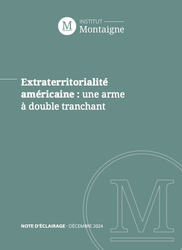
► Full Reference: G. Wright & L. Chetcuti, US Extraterritoriality: The Trump Card, Institut Montaigne, Explainer, December 2024, 62 p.
____
____
📓read the English Summary of the Explainer
____
📓read the presentation of this Explainer made on the Institut Montaigne's website
____
► English Summary of the Explainer (done by the Authors): "Extraterritoriality — the application of national laws abroad — has grown exponentially over the last two decades. In a world characterized by strategic competition and weak international organizations, many countries are turning to law to secure their interests. None more than the United States.
There are good and bad uses of US extraterritoriality. It has become a key tool to uphold international law and to safeguard the US’ interests. It has helped to sanction hostile states and combat corruption, money laundering, organized crime and terrorism. It has helped to reduce excessive risk-taking by companies and has been used to manage US-China systemic rivalry. However, the US has also been accused of using it as a way to assert market dominance.
Could extraterritoriality be the next Trump Card the United States plays? During his first term, President Trump tightened export controls and expanded US laws to combat human rights abuses. At the same time, he rolled back banking regulations and asked his team to review US laws that created unnecessary red tape. Recently, he warned that he would remove any sanctions that weakened the dollar’s dominant position. The extent to which extraterritoriality is used to exert political pressure on EU countries is unclear.
The EU must be better prepared. Companies that fail to comply with US rules risk huge fines, handover of sensitive data and exclusion from the US market. European companies often prefer to comply with US rules, rather than abide by European measures designed to block their application. This poses a direct challenge to the sovereignty of the EU and its member states.
Institut Montaigne’s latest issue paper provides a framework for understanding all dimensions of US extraterritoriality and offers decision-makers and businesses a roadmap for an informed response. Understanding the implications of US extraterritoriality is crucial for governments and businesses, and should be integral to the EU's approach to economic security.".
________
Dec. 1, 2024
Law by Illustrations

► Référence complète : M.-A. Frison-Roche., "Mise à l'épreuve d'une affirmation "La Justice, c'est la Vérité en Action" : 🎬𝑱𝒖𝒓𝒐𝒓 #𝟐", billet décembre 2024.
🎞️voir le film-annonce
___
Dans la leçon sur le Droit et la Justice que propose Clint Eastwood dans son dernier film, 𝑱𝒖𝒓𝒐𝒓 #𝟐, une des premières scènes nous montre la procureure qui attaque et l'avocat qui défend. Ils se connaissent depuis longtemps et ce n'est pas tant le cas qu'ils évoquent, l'une pour obtenir la condamnation du suspect l'autre pour obtenir la déclaration de son innocence : ils étaient étudiants ensemble. Ils racontent le professeur qui apprit aux deux ce qu'est le Droit et la justice. L'avocat de la défense rappelle que celle qui aujourd'hui est procureure était l'étudiante préférée du Maître. Ce temps est lointain, puisque lui a sans doute moins bien réussi tandis qu'elle construit une carrière brillante et c'est en gagnant des procès qu'elle espère débuter une carrière politique sur le thème de l'ordre, la sécurité et la lutte contre la criminalité.

Lors de cette discussion entre deux juristes professionnels de la justice qui, même s'ils sont de chaque côté de la barrière chacun dans son rôle, ils se souviennent du même enseignement qu'ils ont reçu du même professeur dans le même cursus de Droit, construit sur la définition même de ce qu'est la Justice.
Le professeur avait dit :
La justice, c'est la vérité en action
C'est pourquoi l'élève préférée choisit de devenir procureure, c'est-à-dire celui qui agit pour que la Vérité se transforme en Justice : que le coupable soit appelé Coupable, que l'innocent soit appelé Innocent.
Dans cette définition toute aristotélicienne de ce qu'est le rapport entre la Vérité et la procédure judiciaire qu'y joue chacun, et notamment le procureur qui actionne l'action publique, se joue tout le film.
Et son dénouement, par lequel celle qui avait tous les moyens de transformer son office de procureure en carrière politique et qui garda en tête ce que lui enseigna son professeur à la fois ce qu'est l'appareillage juridictionnel et ce pour quoi il est fait et la façon dont chacun doit y tenir son rôle : le procureur, l'accusé, l'avocat et le juré :

Nous pouvons aussi bien regarder cette leçon de Droit et en tirer profit.
____
Nov. 5, 2024
Publications
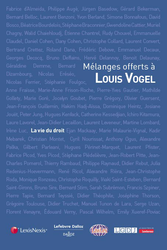
🌐follow Marie-Anne Frison-Roche on LinkedIn
🌐subscribe to the Newsletter MAFR Regulation, Compliance, Law
____
► Full Reference: M.-A. Frison-Roche, "Naissance d'une branche du Droit : le Droit de la Compliance" ("Birth of a branch of Law: Compliance Law"), in Mélanges offerts à Louis Vogel. La vie du droit, LexisNexis - Dalloz - LawLex - LGDJ, 2024, pp.177-188.
____
📝read the article (in French)
____
____
► English Summary of the article: The study focuses on the various movements that have given rise to Compliance Law, with particular emphasis on Competition Law.
After a preliminary reflection on the construction of the legal system into branches of Law, their classification in relation to each other, the difficulty encountered in this respect by Economic Law, and the various movements that give rise to one of them, the diversity of which the branch subsequently keeps track of, the study is constructed in 4 parts.
To find out what gave rise to Compliance Law, the first part invites everyone to reject the narrow perspective of a definition that is content to define it by the fact of "complying" with the applicable regulations in the sens to obey them automatically. This has the effect of increasing the effectiveness of the regulations, but it does not produce a branch of Law, being only an efficiency tool like any other.
The second part of the study aims to shed light on what appears to be an "enigma", because it is often claimed that this is the result of a flexible method through the "soft law", or of an American regulation (for instance FCPA), or of as many regulations as there are occasions to make. Instead, it appears that in the United States, in the aftermath of the 1929 crisis, it was a question of establishing an authority and rules to prevent another atrocious collapse of the system, while in Europe, in 1978, in memory of the use of files about Jews, it was a question of establishing an authority and rules to prevent an atrocious attack on human rights. A common element that aims for the future ("never again"), but not the same object of preventive rejection. This difference between the two births explains the uniqueness and diversity of the two Compliance Law, the tensions that can exist between the two, and the impossibility of obtaining a global Compliance Law.
The third part analyses the way in which Competition Law has given rise to conformity mechanisms: they had only constituted a secondary branch which is a guarantee of conformity with competition regulations. Developed in particular through the soft law issued by the competition authorities, the result is a kind of "soft obedience", a well-understood collaboration of a procedural type through which the company educates, monitors and even sanctions, without going outside Competition Law, of which compliance (in the sens of conformity) is the appendix. The distance between a conformity culture and Compliance Law can be measured here.
The fourth part aims to show that Competition Law and Compliance Law are two autonomous and articulated branches of Law. Since Compliance Law is a autonomous and strong branch of Law built around Monumental Goals, in particular the sustainability of systems and the preservation of the human beings involved so that they are not crushed by these systems but benefit from them : the current challenge of European integration is to build the pillar of Compliance Law alongside the competitive pillar. Jurisdictions are in the process of doing this and articulating them.
________
April 18, 2024
Thesaurus : Doctrine
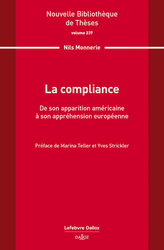
► Référence complète : N. Monnerie, La compliance. De son apparition américaine à son appréhension européenne, Dalloz, coll. "Nouvelle Bibliothèque de Thèses", vol. 237, 2024, 500 p.
____
____
📗lire le sommaire de l'ouvrage
____
📗lire la table des matières de l'ouvrage
____
► Résumé de l'ouvrage (fait par l'éditeur) : "Cette recherche est consacrée à l'émergence de la compliance dans la sphère juridique. À ce titre, elle constitue une des premières études transversales sur cette nouvelle notion.
Appliquée à l'encadrement du comportement des grandes sociétés, la compliance effraie tant qu'elle fascine, alors qu'elle a parfois été considérée comme un phénomène non juridique, une régulation hors du droit. L'intuition émaillant cet ouvrage soutient que la notion de compliance désigne un instrument juridique uniforme et fonctionnel. Enjeu majeur des entreprises et des organisations de tous secteurs, la compliance étend de plus en plus son champ et sa complexité. La mise en place d'un système de compliance efficace est un défi pour de nombreuses entreprises, qui doivent concilier exigences légales et réglementaires avec les contraintes opérationnelles et les objectifs économiques des sociétés. De leur côté, les États sont également confrontés à cet instrument au travers des sanctions prononcées par les autorités étrangères à l'encontre de sociétés domestiques.
L'ambition de cet ouvrage est de systématiser le processus de la compliance, d'analyser son incidence sur l'encadrement des sociétés, tout en appréciant l'opportunité de sa transplantation hors des États-Unis.
Une approche macro-comparative et historique démontre comment la compliance a fini par devenir un instrument permettant à l'État américain de déléguer le contrôle de l'application des normes substantielles. D'un instrument au service de la gestion du risque des sociétés, elle a fini par devenir un standard axé sur la prévention et la coopération. L'étude de l'exportation de la compliance révèle, au moyen de micro-comparaisons, que son arrivée en Europe résulte de l'application extraterritoriale du droit américain. Tout en démontrant qu'après avoir rejeté cette pratique, certains États ont décidé de recourir à une transplantation légale afin d'intégrer cet instrument dans leur ordre juridique.
L'ouvrage conclu en dressant plusieurs pistes de réflexion adressée aux autorités législatives afin de les aider à appréhender les difficultés inhérentes à la transplantation de la compliance.".
________

Updated: March 15, 2024 (Initial publication: Nov. 30, 2023)
Publications

🌐follow Marie-Anne Frison-Roche on LinkedIn
🌐subscribe to the Newsletter MAFR Regulation, Compliance, Law
🌐subscribe to the Video Newsletter MAFR Surplomb
____
 ► Full Reference: M.-A. Frison-Roche, Births of a branch of Law: Compliance Law, Working Paper, November 2023.
► Full Reference: M.-A. Frison-Roche, Births of a branch of Law: Compliance Law, Working Paper, November 2023.
____
📕This Working Paper was drawn up as a basis for a contribution to the collective book given to Professor Louis Vogel, published in 2024
____
► Summary of this Working Paper: The study looks at the various movements that have given birth to Compliance Law, with particular emphasis on Competition Law.
After a preliminary reflection on the construction of the legal system into branches of Law, their classification in relation to each other, the difficulty encountered in this respect by Economic Law, and the various movements that give birth to one of them, the diversity of which the branch subsequently keeps track of, the study is constructed in 4 parts.
To find out what gave rise to Compliance Law, the first part invites us to reject the narrow perspective of a definition that is content to define it by the fact of "being conform" with all the applicable regulations. This has the effect of increasing the efficacy of the regulations, but it does not produce a branch of Law, being just a set of tools like others.
The second part of the study aims to shed some light on what appears to be an "enigma", as it is often claimed that this is the result of a soft method, or of an American political decision, or of as many regulations as there are occasions to make. Instead, it appears that in the United States, in the aftermath of the 1929 crisis, it was a decision of establishing an authority and rules to prevent another atrocious collapse of the system, while in Europe in 1978, in memory of the use of files of personal and racial information, it was a question of establishing an authority and rules to prevent an atrocious attack on human rights. A common element that aims for the future ("never again") but not the same object of preventive rejection. This difference between the two births explains the uniqueness and diversity of the two Compliance Laws, the tensions that can exist between the two, and the impossibility of obtaining a global Law.
The third part analyses the way in which Competition Law has given rise to conformity: a secondary branch which is a guarantee of conformity with competition rules. Developed in particular through the soft law issued by the competition authorities, the result is a kind of soft obedience, a well-understood collaboration of the procedural type through which the firm educates, monitors and even sanctions, without leaving the cercle of Competition Law, of which conformity is an appendix. The distance between a culture of conformity and the substantial Compliance Law can be measured here.
The fourth part aims to show that Competition Law and Compliance Law are two autonomous and articulated branches of Law. Since Compliance Law is a branch of Law built on Monumental Goals, in particular the sustainability of systems and the preservation of the human beings involved so that they are not crushed by them but benefit from them, the current challenge of European integration is to build the pillar of Compliance Law alongside the competitive pillar. Jurisdictions are in the process of doing this and of linking the two.
____
🔓read the Working Paper below⤵️
Feb. 29, 2024
Thesaurus : Doctrine

► Full Reference: B. Fiorini, "Approche doctrinale de l’enquête interne et de l’enquête pénale privée" ("Doctrinal approach to internal investigations and private criminal investigations"), in M.-A. Frison-Roche & M. Boissavy (eds.), Compliance et droits de la défense. Enquête interne – CJIP – CRPC, Journal of Regulation & Compliance (JoRC) and Dalloz, coll. "Régulations & Compliance", 2024, pp. 63-68
____
📕read a general presentation of the book, Compliance et droits de la défense. Enquête interne – CJIP – CRPC, in which this article is published
____
► English Summary of the article (done by the Journal of Regulation & Compliance - JoRC): The author sets out the two profoundly distinct, even opposing, cultures of inquisitorial and adversarial repressive procedural systems. The former gives confidence and power to public officials to find the truth, while the latter gives confidence and power to the opposing parties in the dispute. Private investigations naturally develop in the second system and not in the first.
This second system of thought is rooted in the United States, which naturally welcomes internal investigations carried out by companies and associates procedural principles such as the rights of the defence, adversarial proceedings and the right to a lawyer. The first system, characteristic of Continental Law systems, is resistant to the very idea of a private criminal investigation. This is why, when the internal investigation mechanism develops within a company, the procedural mechanisms mentioned above are less naturally associated with it.
____
🦉This article is available in full text to those registered for Professor Marie-Anne Frison-Roche's courses
________
Jan. 17, 2024
Thesaurus : Doctrine

► Référence complète : S. L. Dreyfuss, "La lutte anti-corruption : l’emprunt au modèle américain et à ses récentes évolutions", in M.-A. Frison-Roche et M. Boissavy (dir.), Compliance et droits de la défense. Enquête interne – CJIP – CRPC, Journal of Regulation & Compliance (JoRC) et Dalloz, coll. "Régulations & Compliance", à paraître.
____
📕consulter une présentation générale de l'ouvrage, Compliance et droits de la défense - Enquête interne, CIIP, CRPC, dans lequel cet article est publié
____
► Résumé de l'article (fait par le Journal of Regulation & Compliance - JoRC) : S'appuyant sur la pertinence d'une attention toute particulière à porter sur les mécanismes américains, puisqu'ils inspirent tant les législateurs européen et français, par exemple entre le DPA et la CJIP, l'auteur décrit les caractéristiques du nouveau dispositif mis en place en 2022 et 2023 par le DoJ : la Declination et la Presumption of Declination.
Sans plus requérir ni l'autorisation ni l'homologation d'un juge, le DoJ accorde le bénéfice de la garantie de ne pas poursuite, garantie apportée à l'entreprise par ce que l'auteur présente comme un "contrat", en échange de quoi l'entreprise apporte sa pleine collaboration, notamment toutes les preuves dont elle dispose, en premier lieu contre elle-même.
Contrairement à la France où l'enquête est menée par l'entreprise elle-même, il s'agit pour le DoJ d'alimenter ainsi l'enquête qu'elle dirige et dont elle conserve la pleine maîtrise, ayant par ailleurs les moyens matériels et humains de la mener.
____
🦉Cet article est accessible en texte intégral pour les personnes inscrites aux enseignements de la Professeure Marie-Anne Frison-Roche
________
Jan. 17, 2024
Thesaurus : Doctrine

► Référence complète : V. Chatelin, "Enquêtes internes, enquêtes pénales et droits de la défense : que nous disent les jurisprudences américaine et anglaise (l’affaire Connolly et l’affaire ENRC) ?", in M.-A. Frison-Roche et M. Boissavy (dir.), Compliance et droits de la défense. Enquête interne – CJIP – CRPC, Journal of Regulation & Compliance (JoRC) et Dalloz, coll. "Régulations & Compliance", à paraître.
____
📕consulter une présentation générale de l'ouvrage, Compliance et droits de la défense - Enquête interne, CIIP, CRPC, dans lequel cet article est publié
____
► Résumé de l'article (fait par le Journal of Regulation & Compliance - JoRC) : L'article justifie l'objet pris de case law américain et britannique en ce que les enquêtes internes y sont une pratique plus ancienne et que des cas montrent que lorsqu'elles sont menées en lien avec les autorités, aux Etats-Unis, le DoJ, au Royaume-Unis, le SFO, elles peuvent mettre en danger les droits de la défense de ceux qui y sont entendus, puis les liens entre l'entreprise qui collabore à tort et le cabinet d'avocat qui y a aidé.
Pour appuyer cela, l'article décrit en détail les cas américains Gavin, Coburn & Schwart, Tournant , puis le cas britannique ENRC, qui a donné lieu à plusieurs décisions au Royaume-Uni illustre les dangers que fait courir le non-respect du secret professionnel par des avocats chargés de l’enquête interne.'
____
🦉Cet article est accessible en texte intégral pour les personnes inscrites aux enseignements de la Professeure Marie-Anne Frison-Roche
________
March 15, 2023
Conferences
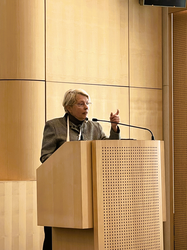
► Full reference: M.-A. Frison-Roche, "Pourquoi le Droit de la Compliance ?" ("Why Compliance Law?"), in Roman Aydogdu et Hans De Wulf (dir.), Bruxelles, 15 march 2023.
____
🧮Read the full programme of this event
________
March 15, 2023
Thesaurus : Doctrine
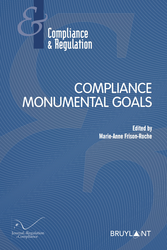
► Full Reference: J.-Ch. Roda, "Compliance, Internal Investigations and International Competitiveness: What are Risks for the French Companies (in the Light of Antitrust Law)?", in M.-A. Frison-Roche (ed.), Compliance Monumental Goals, Journal of Regulation & Compliance (JoRC) and Bruylant, "Compliance & Regulation" Serie, 2023, pp.355-368.
____
📘read a general presentation of the book, Compliance Monumental Goals, in which this article is published
____
► Summary of the article: The author draws on American and European Competition Law to measure whether internal investigations, as far as they provide factual elements, can provide foreign authorities and competitors, here American, with "sensitive information" (notably via leniency programs), and as such constitute a competitive handicap. But this turns out to be quite difficult, whereas compliance audits, for example under the legal duty of vigilance, can provide American litigants with useful information, drawn from internal documents, in particular the reports of compliance officers, which can be captured by procedures of discovery.
French Law remains weak in the face of these dangers, due to its refusal to recognise the legal privilege mechanism concerning these internal documents, contrary to American Law and the consequent effectiveness of discovery in international procedures, concerning internal documents, in particular resulting from internal investigations. Solutions have been proposed, the activation of a new conception of blocking statutes being complex, the prospect of adopting a legal privilege being more effective, but there would remain the hypothesis of an international conflict of privilege, American Law having a strict design of legal advice justifying it and judges checking that powerful companies do not use it artificially.
____
🦉This article is available in full text to those registered for Professor Marie-Anne Frison-Roche's courses
________
Feb. 2, 2023
Thesaurus : Doctrine

► Full Reference: B. Silliman, "Secret professionnel et coopération : les leçons de procédure tirées de l’expérience américaine pour une application universelle" ("Privilege and cooperation, procedural lessons learned from the U.S for global application"), in M.-A. Frison-Roche (ed.), La juridictionnalisation de la Compliance, coll. "Régulations & Compliance", Journal of Regulation & Compliance (JoRC) and Dalloz, 2023, p. 231-234.
____
📕read a general presentation of the book, La juridictionnalisation de la Compliance, in which this article is published
____
► English summary of the article (done by the Journal of Regulation & Compliance): The French legal system is evolving, organizing interaction between lawyers with regulators and prosecutors, especially in investigations about corruption or corporate misconduct, adopting U.S. negotiated resolutions such as the Convention judiciaire d'intérêt public, which encourages "collaboration" between them.
The author describes the evolution of the U.S. DOJ doctrine and askes French to be inspired by the U.S. procedural experience, U.S. where this mechanism came from. Indeed, the DOJ released memoranda about what the "collaboration" means. At the end (2006 Memorandum), the DOJ has considered that the legal privilege must remain intact when the information is not only factual to maintain trust between prosecutors, regulators, and lawyers.
French authorities do not follow this way. The author regrets it and thinks they should adopt the same reasoning as the American authority on the secret professionnel of the avocat, especially when he intervenes in the company internal investigation.
____
🦉This article is available in full text for those registered for Professor Marie-Anne Frison-Roche's courses
